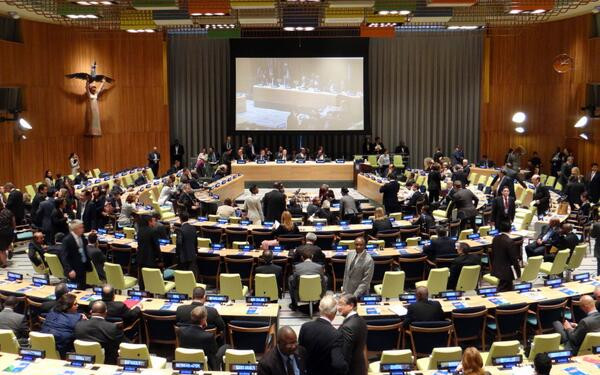16 July 2018 – During today’s Voluntary National Review of Bahrain’s progress toward the 2030 Sustainable Development Goals (SDGs) at the High-Level Political Forum of the United Nations (UN) Economic and Social Council (ECOSOC), Americans for Democracy & Human Rights in Bahrain (ADHRB), in collaboration with Habitat International Coalition of the Housing and Land Rights Network (HIC-HLRN), delivered an oral statement calling for urgent human rights and political reform. The statement specifically urged the government to end corrupt land use policies, release prisoners of conscience like Nabeel Rajab, reinstate arbitrarily dissolved civil society and media institutions like Al-Wasat, and hold perpetrators accountable for rising police brutality and extrajudicial killings.
Please find the full statement below.
___________
Presented by Americans for Democracy & Human Rights in Bahrain and Habitat International Coalition.
Bahrain’s Voluntary National Review (VNR) covers nearly all SDGs, showing policy coherence. However, SDG 2 is effectively left out. While food sovereignty may be at stake, it is not among the cited six key issues.
Meanwhile, Bahrain’s development-resource challenges include severe scarcity of water and land, with large portions of territory foreclosed for military use and only about 10% left for citizens’ housing. Even reclaimed land[1] is over 90% privatized, despite legal prohibitions, making the coastline royal-family property.[2] Coastland grabs have cost small family fisheries their livelihoods and, to the country, a heritage and a pillar of food security.[3]
Toward SDG 11, the government seeks to create new urban communities (p. 35), but corruption still impedes sustainable urbanization. A parliamentary study found 16 corrupt techniques affecting development land, but the VNR reports no remedial efforts.[4] Authorities have now dissolved all major opposition groups ahead of this year’s elections, undermining parliament’s capacity to check corruption, waste, and other obstacles to sustainable development.[5]
The VNR does note that Bahrain tries to “balance security and development in a stable environment” (p. 66). However, the UN has documented a longstanding pattern of material discrimination against Bahrain’s Shi`a majority, including denial of housing, land, and jobs.[6] Protests over these disparities have been violently suppressed by authorities.
Amid these challenges:
- How does the Office of Financial and Administrative Control[7] and other bodies operate to rectify these obstacles (p. 67) and “ensure equal access to land” (p. 74)?
- With many independent civil society organizations, political groups, and newspapers, like al-Wasat, closed and leading human rights defenders, like Nabeel Rajab, imprisoned, how can Bahrain reach SDG targets 16.3, 16.7, and 16.10?
- Extrajudicial killings are on the rise. Will the government identify and prosecute the perpetrators and implement reforms to curb police brutality in line with SDG targets 16.1, 16.3, and 16.6?
___________
[1] Ibrahim Sherif el-Sayed “Territorial and Coastal Usurpation” (“إغتصاب الأراضي للسواح”) The Secretariat and Four Associations Forum, 10 November 2005 (Arabic), cited in Mahmoud Cherif Bassiouni, et. al., Report of the Bahrain Independent Commission of Inquiry , 10 December 2011, p. 21, at:
[2] “State’s Property: National Fights Go on until Citizens’ Lands Restored” (”أملاك الدولة“: المعارك الوطنية ستستمر حتى تسترجع الأراضي للمواطنين”) [Arabic], al-Wasat News (12 May 2010), at:
http://www.alwasatnews.com/2805/news/read/420213/1.html (Arabic).
[3] Sahar Aziz & Abdulla Musalem, Citizens, Not Subjects: Debunking the Sectarian Narrative of Bahrain’s Pro-Democracy Movement (Institute for Social Policy and Understanding, Washington DC, July 2011) http://ispu.org/pdfs/640_ISPU%20Report_Bahrain_Aziz_Musalem_WEB.pdf, p. 11.
[4] Report of the Parliamentary Committee to Investigate Public and Private Property of the State, March 2010 (تقرير لجنة التحقيق البرلمانية حول تحديد أملاك الدولة العامة والخاصة، مارس 2010) [Arabic], at:
http://www.hlrn.org/img/documents/amlak-2-4-t.pdf (Arabic). See also “Bahrain Public Lands Sold and Rented to Private Investors,” The National (25 March 2010), at: http://www.thenational.ae/news/worldwide/middle-east/bahraini-public-lands-sold-and-rented-to-private-investors.
[5] “Bahrain must end worsening human rights clampdown, UN experts say,” Office of the High Commissioner for Human Rights, 16 June 2017, https://www.ohchr.org/EN/NewsEvents/Pages/DisplayNews.aspx?NewsID=21762&LangID=E
[6] “UN rights experts urge Bahrain to end the persecution of Shias,” Office of the High Commissioner for Human Rights, 16 August 2016, https://www.ohchr.org/en/NewsEvents/Pages/DisplayNews.aspx?NewsID=20375
[7] Established by Decree-Law No. 49 of the year 2010. See VNR, p. 67.





